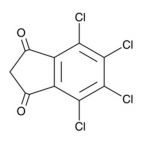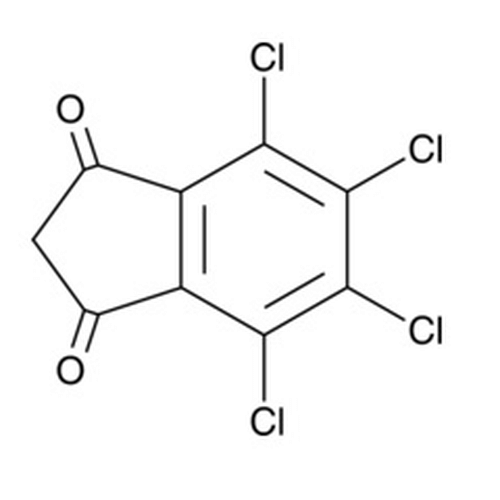| Product Name | TCID |
| Description |
DUB inhibitor |
| Purity | >97% |
| CAS No. | 30675-13-9 |
| Molecular Formula | C9H2Cl4O2 |
| Molecular Weight | 283.9 |
| Field of Use | Not for use in humans. Not for use in diagnostics or therapeutics. For in vitro research use only. |
Properties
| Storage Temperature | -20ºC |
| Shipping Temperature | Shipped Ambient |
| Product Type | Inhibitor |
| Solubility | Soluble in 25 mg/ml DMSO |
| Source | Synthetic |
| Appearance | White Solid |
| SMILES | C1C(=O)C2=C(C1=O)C(=C(C(=C2Cl)Cl)Cl)Cl |
| InChI | InChI=1S/C9H2Cl4O2/c10-6-4-2(14)1-3(15)5(4)7(11)9(13)8(6)12/h1H2 |
| InChIKey | IDLAOWFFKWRNHB-UHFFFAOYSA-N |
| Safety Phrases |
Classification: Caution – Substance not yet fully tested. Safety Phrases: S22 - Do not breathe dust S36/37/39 - Wear suitable protective clothing, gloves and eye/face protection S24/25- Avoid contact with skin and eyes Precautionary Statements: P260- Do not breathe dust/fume/gas/mist/vapours/spray. P285- In case of inadequate ventilation wear respiratory protection. P305+P351+P338- IF IN EYES: Rinse cautiously with water for several minutes. Remove contact lenses, if present and easy to do. Continue rinsing. P310- Immediately call a POISON CENTER or doctor/physician. P501- Dispose of contents/container in accordance with international regulations. Hazard Statements: H334- May cause allergy or asthma symptoms or breathing difficulties if inhaled H373- May cause damage to organs through prolonged or repeated exposure H318- Causes serious eye damage H410- Very toxic to aquatic life with long lasting effects H317- May cause an allergic skin reaction |
| Cite This Product | TCID (StressMarq Biosciences Inc., Victoria BC CANADA, Catalog # SIH-340) |
Biological Description
| Alternative Names | 4,5,6,7-tetrachloro-1H-indene-1,3(2H)-dione |
| Research Areas | Apoptosis, Cancer |
| PubChem ID | 2729042 |
| Scientific Background | Inhibits ubiquitin C-terminal hydrolase L3 (UCH UCHL3). IC50=0.6 M, 125-fold selective over UCHL1, IC50=75 M. Cell permeable. |
| References |
1. Love K.R., et al. (2007) Nat. Chem. Biol. 3: 697. 2. Mtango N.R. et al. (2012) J. Cell Physiol. 227: 2022. |



Reviews
There are no reviews yet.